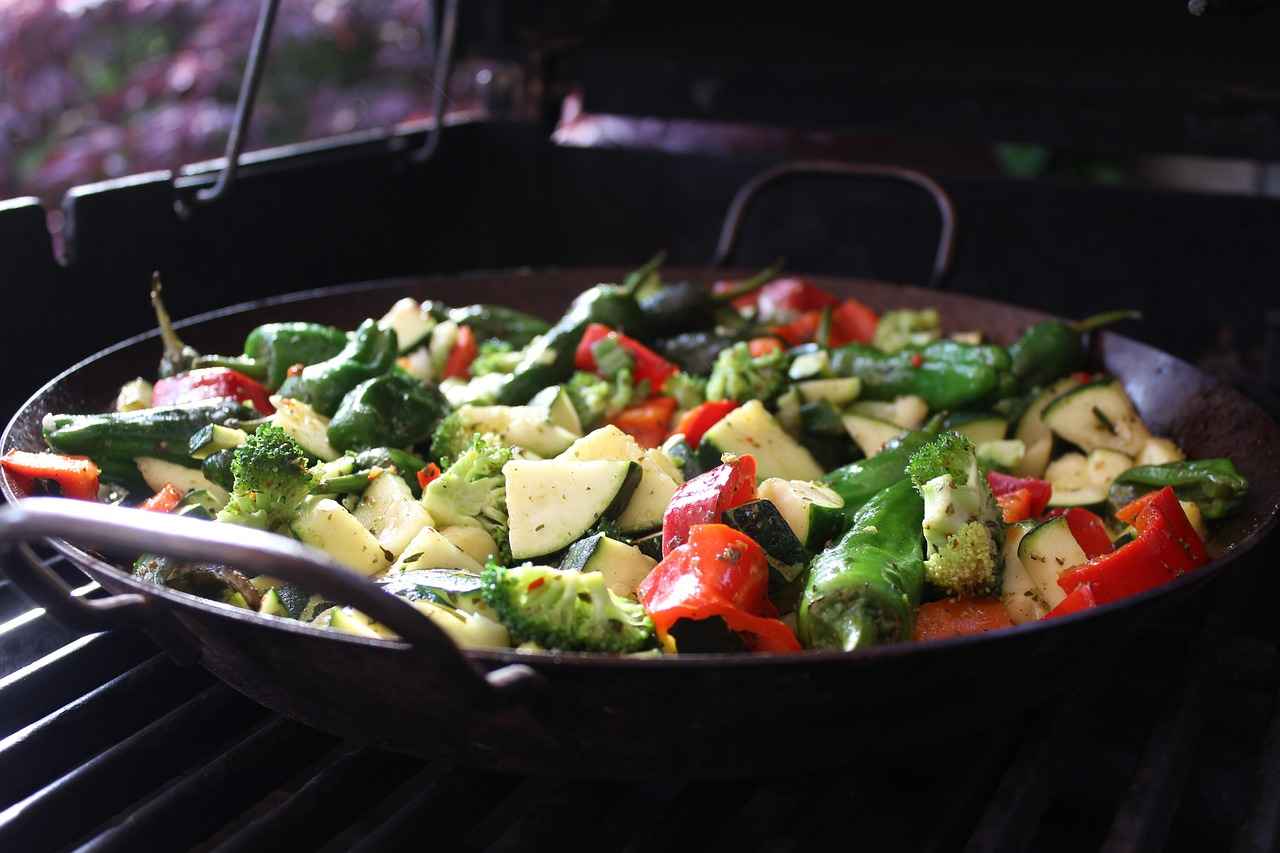This article delves into the key differences between electric and manual vegetable choppers, assisting you in determining which option aligns best with your culinary needs and lifestyle.
1. Understanding Vegetable Choppers
Vegetable choppers are essential kitchen tools designed to streamline the process of cutting, chopping, and dicing vegetables. They can be categorized into two main types: electric and manual, each offering unique features and benefits.
2. Advantages of Electric Vegetable Choppers
Electric vegetable choppers are highly regarded for their speed, efficiency, and ease of use. They are particularly beneficial for busy cooks and families looking to save time in meal preparation.
- 2.1 Speed and Efficiency
Electric choppers can rapidly chop vegetables, significantly reducing meal prep time. This is especially advantageous when preparing large quantities of food.
- 2.2 Consistent Results
These choppers ensure uniform chopping results, which is crucial for even cooking and presentation.
- 2.3 Ease of Use
With minimal effort, you can achieve perfectly chopped vegetables with just the push of a button.
3. Disadvantages of Electric Vegetable Choppers
Despite their advantages, electric choppers do have some drawbacks, such as higher costs and cleaning difficulties.
- 3.1 Cost Considerations
Electric choppers are generally pricier than manual options, which can be a significant factor for budget-conscious consumers.
- 3.2 Cleaning Challenges
Cleaning can be complicated due to electrical components, with some parts not being dishwasher safe.
4. Advantages of Manual Vegetable Choppers
Manual vegetable choppers are often more affordable and easier to clean. They offer a hands-on experience that many cooks prefer for better control over chopping size and texture.
- 4.1 Affordability
Manual choppers are typically less expensive, making them accessible for those seeking a reliable chopping tool without a hefty price tag.
- 4.2 Portability
Lightweight and compact, manual choppers are perfect for camping or small kitchens.
5. Disadvantages of Manual Vegetable Choppers
While they have their perks, manual choppers can be labor-intensive and time-consuming, especially with larger quantities of vegetables.
- 5.1 Time-Consuming
Manual chopping requires more effort and time compared to electric options, which may deter some users.
- 5.2 Inconsistent Results
Achieving uniform cuts can be challenging, often leading to unevenly chopped vegetables.
6. Choosing the Right Vegetable Chopper for You
When deciding between electric and manual vegetable choppers, consider your cooking habits, budget, and personal preferences to find the best fit for your kitchen needs.

1. Understanding Vegetable Choppers
Understanding Vegetable Choppers
Vegetable choppers are essential kitchen tools that streamline the process of cutting, chopping, and dicing vegetables. These handy devices come in two primary categories: electric and manual. Each type offers unique features and benefits that cater to different cooking styles and preferences.
Whether you are a busy parent preparing meals for your family or a culinary enthusiast experimenting with new recipes, choosing the right vegetable chopper can significantly impact your cooking experience.
Types of Vegetable Choppers
- Electric Vegetable Choppers: These devices operate on electricity, providing quick and efficient chopping. They are ideal for those who prioritize speed and convenience in meal preparation.
- Manual Vegetable Choppers: These tools rely on human effort to chop vegetables. They are often more affordable and easier to clean, appealing to those who enjoy a hands-on approach in the kitchen.
Benefits of Using Vegetable Choppers
- Time-Saving: Chopping vegetables can be time-consuming, but vegetable choppers can significantly reduce preparation time.
- Uniformity: Achieving consistent cuts is crucial for even cooking, and vegetable choppers help in delivering uniform sizes.
- Versatility: Many vegetable choppers can handle a variety of vegetables, making them versatile kitchen companions.
Conclusion
In conclusion, whether you opt for an electric or manual vegetable chopper, these tools can enhance your cooking experience by making vegetable preparation quicker and more efficient. Consider your cooking habits and preferences when selecting the right chopper for your kitchen.

2. Advantages of Electric Vegetable Choppers
Electric vegetable choppers are becoming increasingly popular in modern kitchens due to their numerous advantages. These handy appliances not only enhance efficiency but also streamline meal preparation for both busy individuals and families. Below, we explore the key benefits of using electric vegetable choppers.
- Speed and Efficiency: One of the most significant advantages of electric choppers is their ability to chop vegetables at lightning speed. Unlike manual choppers that require physical effort and time, electric choppers can handle large volumes of vegetables in mere seconds. This feature is particularly advantageous for those who often prepare meals for gatherings or meal prep for the week.
- Consistent Results: Electric choppers ensure uniformity in size when chopping vegetables. This consistency is essential for even cooking and presentation, as it helps avoid the common issue of some pieces being overcooked while others remain raw.
- Ease of Use: Operating an electric vegetable chopper is as simple as pressing a button. This user-friendly design makes it accessible for individuals of all cooking skill levels. Even children can safely participate in meal preparation under adult supervision.
- Versatility: Many electric vegetable choppers come with multiple blades and settings, allowing users to chop, slice, or dice vegetables according to their specific needs. This versatility makes them suitable for a wide range of recipes, from salads to stir-fries.
- Time-Saving: For those with busy lifestyles, electric choppers can significantly reduce the time spent on meal prep. This time-saving aspect allows cooks to focus on other essential tasks, making cooking less of a chore and more enjoyable.
In summary, electric vegetable choppers offer a range of benefits, including speed, efficiency, and ease of use, making them an excellent choice for anyone looking to enhance their cooking experience. Whether you are a busy professional or a parent juggling multiple responsibilities, investing in an electric chopper can transform your meal preparation process.
2.1 Speed and Efficiency
Speed and Efficiency are two of the most notable advantages of electric vegetable choppers, making them a popular choice in modern kitchens. Unlike manual choppers, which require physical effort and time, electric choppers can process large quantities of vegetables in a matter of seconds. This rapid chopping capability is particularly advantageous for those who lead busy lifestyles or frequently prepare meals for gatherings.
When using an electric chopper, you can effortlessly chop a variety of vegetables—from onions to carrots—without the tedious task of slicing each piece by hand. For instance, if you are hosting a dinner party and need to prepare a large salad, an electric chopper can significantly cut down on prep time, allowing you to focus on other aspects of meal preparation.
Moreover, electric choppers ensure consistent results. Every piece of vegetable is chopped to a uniform size, which is essential for even cooking and an aesthetically pleasing presentation. This is particularly important for dishes that require precise cooking times, as unevenly chopped vegetables can lead to some pieces being overcooked while others remain raw.
In addition to speed, electric choppers are designed for ease of use. With just a simple push of a button, you can achieve finely chopped vegetables, making them user-friendly even for those who may not be very experienced in the kitchen. This feature is especially beneficial for individuals with limited hand strength or dexterity, as it eliminates the need for manual chopping.
In summary, the speed and efficiency of electric vegetable choppers not only streamline meal preparation but also enhance the overall cooking experience. Whether you are preparing a quick weeknight dinner or a lavish feast, these appliances can be invaluable tools in any kitchen.
2.1.1 Ideal for Large Meals
Electric choppers are revolutionizing the way we prepare meals, especially when it comes to handling large volumes of vegetables. This capability makes them an indispensable tool for those who love to entertain or meal prep for the week ahead. Imagine hosting a gathering or preparing a week’s worth of meals without spending hours in the kitchen. With electric choppers, this is not just a dream; it’s a reality.
When it comes to efficiency, electric choppers stand out. They can chop, dice, and slice a variety of vegetables in a fraction of the time it would take using manual methods. For instance, if you’re preparing a large salad or cooking for a family gathering, an electric chopper can handle multiple vegetables simultaneously, drastically cutting down on your cooking time. This means you can spend less time in the kitchen and more time enjoying the company of your guests.
Moreover, the consistency of the chopping results is another significant advantage. Electric choppers ensure that vegetables are cut to a uniform size, which is crucial for even cooking and presentation. Whether you are making a stir-fry, soup, or salad, having evenly chopped vegetables not only enhances the dish’s appearance but also ensures that all ingredients cook at the same rate, resulting in a delicious and well-prepared meal.
In addition to these benefits, electric choppers are equipped with various settings that allow you to customize the size of the chop according to your recipe’s requirements. This versatility makes them suitable for a wide range of dishes, from chunky salsas to finely diced onions.
In conclusion, if you frequently prepare large meals or enjoy meal prepping, investing in an electric vegetable chopper can significantly enhance your cooking experience. By reducing preparation time and ensuring consistent results, these kitchen appliances allow you to focus on what truly matters—creating delicious meals and enjoying them with your loved ones.
2.1.2 Consistent Results
When it comes to meal preparation, achieving consistent results in chopping vegetables is essential. Electric vegetable choppers excel in this area, providing a level of precision that is often difficult to achieve manually. The uniformity in size that electric choppers deliver ensures that all vegetables are cut to the same dimensions, which is crucial for a few reasons:
- Even Cooking: When vegetables are chopped uniformly, they cook at the same rate. This is particularly important when roasting or sautéing, where unevenly sized pieces can lead to some vegetables being overcooked while others remain undercooked.
- Aesthetic Appeal: Presentation matters in culinary arts. Dishes that feature neatly chopped vegetables are more visually appealing, making them more enticing to serve and eat. Electric choppers help maintain this aesthetic by producing consistently sized pieces.
- Flavor Distribution: Uniformly chopped vegetables can enhance flavor distribution in dishes. Whether you’re preparing a stir-fry or a salad, having pieces that are the same size ensures that each bite contains a balanced mix of flavors.
Moreover, electric choppers often come with various settings that allow users to choose the size of the chop, whether fine, medium, or coarse. This versatility adds to their appeal, as cooks can achieve their desired texture without the hassle of manual chopping.
In summary, the consistent results provided by electric vegetable choppers not only streamline the cooking process but also enhance the overall quality of your meals. By investing in an electric chopper, you can ensure that your culinary creations are both delicious and visually appealing.
2.2 Ease of Use
When it comes to kitchen appliances, ease of use is a critical factor for many home cooks. Electric vegetable choppers stand out in this regard, providing a user-friendly experience that simplifies meal preparation. With just the push of a button, you can achieve finely chopped vegetables in mere seconds, making them an excellent choice for both novice and experienced chefs alike.
One of the key benefits of electric choppers is their intuitive design. Most models come equipped with straightforward controls that allow users to adjust the chopping speed and consistency with minimal effort. This means you can easily switch from a coarse chop for soups to a fine dice for salads without needing to change tools or techniques.
- Quick Preparation: Electric choppers can significantly reduce prep time, allowing you to focus on cooking rather than chopping.
- Minimal Physical Effort: Unlike manual choppers that require constant hand strength and effort, electric models do the hard work for you.
- Safety Features: Many electric choppers are designed with safety in mind, incorporating features such as automatic shut-off and secure locking mechanisms to prevent accidents.
Moreover, the cleaning process can also be simplified with many electric choppers featuring removable, dishwasher-safe parts. This feature not only saves time but also ensures that your chopper is hygienic and ready for the next use.
In summary, the ease of use offered by electric vegetable choppers makes them a valuable addition to any kitchen. Whether you are preparing a quick weeknight dinner or a large meal for guests, these appliances can streamline your cooking process, allowing you to enjoy more time with family and friends.

3. Disadvantages of Electric Vegetable Choppers
While electric vegetable choppers offer numerous benefits, they also present some notable drawbacks that potential buyers should consider before making a purchase. Understanding these disadvantages can help you make a more informed decision that aligns with your cooking needs and lifestyle.
- 3.1 Higher Costs: One of the most significant disadvantages of electric vegetable choppers is their higher price point compared to manual versions. For budget-conscious consumers, this can be a major factor. While the initial investment may seem steep, it’s essential to weigh this against the time and effort saved during meal preparation.
- 3.2 Reliance on Electricity: Electric choppers require a power source to operate, which can be a limitation in certain situations. For example, during a power outage or when camping, you may find yourself unable to use your electric chopper. This reliance on electricity can also be a concern for those living in areas with frequent power interruptions.
- 3.3 Cleaning Difficulties: Cleaning electric vegetable choppers can be a cumbersome task. Many models come with intricate parts and electrical components that are not dishwasher safe. This necessitates careful hand washing, which can be time-consuming and may deter users who prefer easy-to-clean kitchen tools.
- 3.4 Potential for Over-processing: Another drawback is the risk of over-processing vegetables. Electric choppers can quickly turn fresh produce into mush if not monitored closely. This can be particularly frustrating when a recipe calls for a specific texture.
- 3.5 Limited Control: While electric choppers offer speed, they may not provide the same level of control as manual choppers. Some cooks prefer the hands-on approach to achieve their desired cuts and textures, which can be challenging with an electric model.
In conclusion, while electric vegetable choppers can significantly enhance your cooking efficiency, it is crucial to consider these disadvantages. Assessing your cooking habits, budget, and preferences will help you determine whether an electric chopper is the right choice for your kitchen.
3.1 Cost Considerations
Cost Considerations are a critical factor when choosing between electric and manual vegetable choppers. For many consumers, especially those on a tight budget, the price difference can be a decisive element in their purchasing decision.
Electric vegetable choppers typically come with a higher price tag compared to their manual counterparts. This price disparity can be attributed to the advanced technology and additional features that electric models offer. For instance, electric choppers often have powerful motors, multiple speed settings, and various attachments, which enhance their functionality.
However, the initial investment in an electric chopper can be seen as worthwhile for those who frequently prepare large meals or have busy lifestyles. The speed and efficiency of electric choppers can significantly reduce meal prep time, making them an appealing choice for families or individuals who value convenience.
On the other hand, manual vegetable choppers are generally more affordable, making them accessible to a broader range of consumers. These choppers can be an excellent option for those who cook occasionally or have limited kitchen space. Furthermore, they often require no electricity, allowing for use in various settings such as camping trips or outdoor gatherings.
Ultimately, the decision between electric and manual vegetable choppers should consider not only the upfront costs but also the long-term benefits. Consumers should evaluate how often they cook, the volume of food they typically prepare, and their willingness to invest in kitchen appliances. By weighing these factors, one can make an informed decision that aligns with their culinary needs and budget.
| Type | Price Range | Features | Best For |
|---|---|---|---|
| Electric | $$$ | Fast, efficient, multiple settings | Frequent cooks, large meal prep |
| Manual | $ | Simple, portable, no electricity needed | Occasional cooks, limited space |
In conclusion, understanding the cost considerations associated with electric and manual vegetable choppers can help consumers make the best choice for their cooking habits and financial situation. Whether you prioritize speed and efficiency or affordability and simplicity, there is a vegetable chopper that fits your needs.
3.2 Cleaning Challenges
Cleaning Challenges of Electric Vegetable Choppers
When it comes to maintaining your kitchen appliances, electric vegetable choppers present unique cleaning challenges that can be daunting for some users. Unlike manual choppers, which are typically straightforward to clean, electric models often contain various electrical components that complicate the cleaning process.
Many electric choppers feature parts that are not dishwasher safe. This means that after preparing your favorite dishes, you may need to invest extra time in hand washing the individual components. This can include the chopping bowl, blades, and other removable parts. It is essential to follow the manufacturer’s instructions to avoid damaging any sensitive electrical components.
Moreover, the intricate design of some electric choppers can make it difficult to reach certain areas during cleaning. Food particles can become lodged in crevices, requiring thorough attention to ensure that no residue remains. This is particularly important for maintaining hygiene and preventing any potential buildup of bacteria.
To simplify the cleaning process, consider the following tips:
- Disassemble Carefully: Always disassemble the chopper according to the manufacturer’s guidelines to avoid damaging any parts.
- Use Warm Soapy Water: Soak removable parts in warm soapy water to loosen any stuck-on food before scrubbing.
- Utilize a Brush: A small brush can help reach tight spots where food may get trapped.
- Dry Thoroughly: Ensure all parts are completely dry before reassembling to prevent any electrical issues.
In conclusion, while electric vegetable choppers offer unparalleled speed and efficiency in food preparation, their cleaning challenges can be a drawback for some users. By understanding these challenges and employing effective cleaning strategies, you can maintain your chopper in optimal condition and enjoy its benefits for years to come.

4. Advantages of Manual Vegetable Choppers
When it comes to kitchen tools, manual vegetable choppers offer a range of advantages that can enhance your cooking experience. These tools are not only practical but also provide a unique hands-on approach that many cooks appreciate. Below are some key benefits of using manual vegetable choppers:
- Affordability: Manual choppers are typically more budget-friendly than their electric counterparts. This makes them an excellent choice for home cooks who want reliable tools without a hefty price tag.
- Ease of Cleaning: One of the standout features of manual choppers is their simplicity in cleaning. With fewer components and no electrical parts, they can be quickly rinsed and wiped down, making post-cooking cleanup a breeze.
- Control Over Chopping: Manual choppers allow users to have greater control over the size and texture of the chopped vegetables. This hands-on experience can lead to more personalized results, catering to specific recipes or preferences.
- Portability: These choppers are generally lightweight and easy to transport, making them ideal for outdoor cooking, camping trips, or small kitchens where space is at a premium.
- Durability: Most manual choppers are made from sturdy materials, ensuring they can withstand frequent use without the risk of breaking down, unlike some electric models.
In conclusion, manual vegetable choppers present a variety of advantages that cater to different cooking styles and preferences. Whether you are a seasoned chef or a beginner, these tools can enhance your food preparation experience by providing affordability, ease of use, and control over your culinary creations.
4.1 Affordability
When it comes to kitchen tools, affordability is a crucial factor for many consumers. Manual vegetable choppers stand out as a cost-effective option, making them an attractive choice for those who want a reliable chopping tool without incurring hefty expenses. Unlike their electric counterparts, which often come with a higher price tag due to advanced features and technology, manual choppers provide a simpler solution that meets basic chopping needs.
These manual devices typically range from less than $10 to around $30, depending on the brand and materials used. This price range makes them accessible to a wider audience, including students, young professionals, and families on a budget. In contrast, electric choppers can cost anywhere from $30 to over $100, which may be prohibitive for some.
Moreover, the affordability of manual choppers does not compromise their functionality. Many models are designed with durable materials and efficient mechanisms that allow for effective chopping, dicing, and slicing. This means that users can achieve satisfactory results without spending a fortune.
In addition to their lower upfront cost, manual vegetable choppers also incur minimal ongoing expenses. They do not require electricity, which can lead to savings on energy bills over time. This is particularly beneficial for those who use their chopper frequently, as it eliminates the need for an electric outlet and allows for use in various settings, such as during camping trips or in outdoor kitchens.
In summary, the affordability of manual vegetable choppers makes them a practical choice for anyone looking to enhance their cooking experience without overspending. With their reliable performance and low maintenance costs, these tools are a smart investment for both novice and experienced cooks alike.
4.2 Portability
Portability is a significant advantage of manual vegetable choppers, making them a go-to choice for various situations. These choppers are not only lightweight but also compact, allowing for easy transportation and storage. Whether you are going on a camping trip, enjoying a picnic in the park, or simply dealing with limited kitchen space, manual choppers can be your best culinary companion.
One of the most appealing aspects of manual choppers is their versatility. They can be used in different environments without the need for electrical outlets. This feature is particularly beneficial for outdoor cooking and meal preparation, where access to power may be limited. Imagine preparing fresh salads or chopping vegetables for a stir-fry while surrounded by nature; a manual chopper makes this possible.
In small kitchens, where every inch of counter space counts, manual choppers shine due to their space-saving design. Unlike bulky electric choppers that require dedicated storage, manual options can easily fit in drawers or cabinets, ensuring your kitchen remains organized and clutter-free.
- Perfect for Camping: Lightweight and easy to carry, manual choppers can be packed in your camping gear, allowing you to prepare fresh meals in the great outdoors.
- Ideal for Picnics: Bring along a manual chopper to quickly prepare salads or snacks, enhancing your outdoor dining experience.
- Convenient for Small Kitchens: Their compact size makes manual choppers a practical choice for apartments or homes with limited space.
In conclusion, the portability of manual vegetable choppers makes them an excellent choice for those who value convenience and efficiency in various settings. Whether you’re a seasoned chef or a casual cook, having a reliable manual chopper at your disposal can enhance your culinary adventures.

5. Disadvantages of Manual Vegetable Choppers
While manual vegetable choppers offer several benefits, such as affordability and portability, they come with their own set of challenges that can affect their usability in a busy kitchen environment. Below are some of the key disadvantages that users should consider before opting for a manual chopper.
- Labor-Intensive: Using a manual vegetable chopper can be quite physically demanding. The process of chopping, especially for larger quantities, requires consistent effort and can lead to fatigue. This might not be ideal for individuals who prefer a more relaxed cooking experience.
- Time-Consuming: Preparing meals with a manual chopper can take significantly longer compared to electric options. Manually chopping vegetables demands attention and patience, which can be a drawback for those who are short on time or preparing meals for a large group.
- Inconsistent Results: Achieving uniform cuts can be challenging with manual choppers. Unlike electric choppers that provide consistent results, manual chopping often leads to unevenly sized pieces. This inconsistency can affect cooking times and the overall presentation of dishes.
- Limited Capacity: Many manual choppers have a smaller capacity compared to their electric counterparts. This limitation means that users may need to chop in batches, further extending the time required for meal preparation, particularly when dealing with large quantities of vegetables.
- Skill Level: Effective use of manual choppers often requires a certain level of skill. Inexperienced cooks may struggle to achieve the desired results, leading to frustration and potentially discouraging them from using the tool altogether.
In conclusion, while manual vegetable choppers can be an excellent addition to any kitchen, it’s essential to weigh these disadvantages against their benefits. For those who prioritize speed and convenience, an electric chopper may be the better choice. However, for cooks who enjoy the process of chopping and prefer a hands-on approach, a manual chopper can still be a valuable tool.
5.1 Time-Consuming
Chopping vegetables manually can indeed be a time-consuming process, especially when preparing meals for larger gatherings or meal prepping for the week. Unlike electric choppers, which can swiftly handle multiple vegetables in seconds, manual chopping requires significant effort and patience. Many users find that the time invested in manual chopping may not be worth the effort, particularly when they have busy schedules or numerous tasks to complete in the kitchen.
For instance, a simple task like dicing onions or slicing bell peppers can take several minutes when done by hand. This becomes even more apparent when one needs to chop a variety of vegetables for a single meal. The repetitive motion and attention to detail can lead to fatigue, making the cooking experience less enjoyable.
Additionally, the lack of speed can impact overall meal preparation. When you are in a rush, the idea of spending extra time chopping vegetables can be discouraging. This is one of the main reasons why many cooks opt for electric choppers, as they provide a quick solution without sacrificing quality.
In conclusion, while manual chopping can offer a sense of control and satisfaction for some, the time and effort required can be a significant drawback. For those who prioritize efficiency and speed, electric choppers may be the better choice, allowing for a more seamless cooking experience.
5.2 Inconsistent Results
Inconsistent Results are a common concern when using manual vegetable choppers. Unlike their electric counterparts, achieving uniform cuts with manual choppers can be quite challenging. This often leads to unevenly chopped vegetables, which can significantly affect cooking times and overall dish quality.
When vegetables are cut into varying sizes, they cook at different rates. For example, larger pieces may remain raw while smaller ones become overcooked. This inconsistency can be particularly problematic in recipes where even cooking is crucial, such as stir-fries or soups. The aesthetics of a dish can also suffer; unevenly chopped vegetables can create a less appealing presentation.
Moreover, the manual chopping process requires more effort and attention to detail. Users must focus on their cutting technique to try and achieve a similar size for each piece. This can lead to fatigue, especially when preparing larger quantities of vegetables. For those who are less experienced in the kitchen, this may result in frustration and less enjoyable cooking experiences.
While manual choppers can be a cost-effective and portable solution, the potential for inconsistency in results is a significant drawback. For individuals who prioritize efficiency and uniformity, electric choppers may be the more suitable choice. They not only save time but also ensure that all vegetables are chopped evenly, leading to better cooking outcomes and enhanced presentation.
In conclusion, while manual vegetable choppers offer benefits such as affordability and portability, the challenge of achieving consistent results cannot be overlooked. For those who value precision in their cooking, investing in an electric chopper might be the best path forward.

6. Choosing the Right Vegetable Chopper for You
When it comes to selecting the perfect vegetable chopper for your kitchen, the choice between electric and manual options can significantly impact your cooking experience. Understanding the key differences will help you make an informed decision that aligns with your culinary habits, budget, and personal preferences.
1. Assess Your Cooking Habits
Consider how often and how much you cook. If you frequently prepare large meals or enjoy batch cooking, an electric vegetable chopper might be the best fit for you. These devices can handle large quantities of vegetables quickly and efficiently, saving you precious time during meal prep.
2. Budget Considerations
Electric choppers often come with a higher price tag compared to manual options. If you’re on a tight budget, a manual chopper could be a more economical choice. They are generally less expensive and still get the job done, making them accessible for most home cooks.
3. Preference for Control
Some cooks prefer the hands-on approach that manual choppers offer. With a manual chopper, you can control the size and texture of your vegetables, allowing for a more personalized cooking experience. If you enjoy the art of cooking and want to engage more with your ingredients, a manual option may be ideal.
4. Cleaning and Maintenance
Consider the cleaning process as well. Electric choppers may have parts that are not dishwasher safe, which can complicate maintenance. In contrast, manual choppers are typically easier to clean, requiring just a quick rinse or wash.
5. Space and Portability
If you have limited kitchen space or plan to use your chopper in different locations, such as camping or picnics, a manual chopper is lightweight and portable, making it a practical choice.
Ultimately, the decision between an electric and a manual vegetable chopper depends on your unique cooking style, budget, and preferences. By carefully considering these factors, you can choose the right vegetable chopper that enhances your cooking experience and meets your kitchen needs.
Frequently Asked Questions
- What is the main difference between electric and manual vegetable choppers?
The primary difference lies in their operation. Electric choppers are powered by electricity, offering speed and efficiency, while manual choppers rely on your own effort, providing more control but requiring more time.
- Are electric vegetable choppers worth the investment?
If you frequently prepare large meals or have a busy lifestyle, electric choppers can be a game-changer, saving you time and effort in the kitchen. However, if you only chop occasionally, a manual chopper might suffice.
- How do I clean an electric vegetable chopper?
Cleaning electric choppers can be tricky due to their electrical components. Always refer to the manufacturer’s instructions, but generally, you can remove detachable parts and wash them by hand. Some may not be dishwasher safe.
- Can I achieve uniform cuts with a manual vegetable chopper?
While manual choppers can offer a hands-on experience, achieving perfectly uniform cuts can be challenging. It requires practice and may result in uneven sizes, affecting cooking times.
- Are manual vegetable choppers portable?
Absolutely! Manual choppers are lightweight and easy to carry, making them perfect for outdoor activities like camping or picnics, where space and power outlets might be limited.














